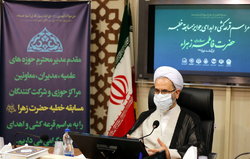 The head of the Islamic Seminaries of Iran said, “The Sermon of Fadak of Lady Fatimah al-Zahra is a symbol of deep thought, the manner of worship and obeying God Almighty.”
The head of the Islamic Seminaries of Iran said, “The Sermon of Fadak of Lady Fatimah al-Zahra is a symbol of deep thought, the manner of worship and obeying God Almighty.” RNA – In a speech at the closing ceremony and lottery at Sermon of Fadak reading contest at the Ayatollah Haeri Assembly Centre of the Management Centre of the Islamic Seminaries, Ayatollah Alireza Arafi said, “Although Lady Fatimah al-Zahra is famous among the Shi’ahs for living to only 18 years of age and her life was seemingly short based on the social calendar, but in the epistemological, intellectual, social and political calendar, her short life is as valuable to the extent of centuries.”
The head of the Islamic Seminaries of Iran continued, “If the seemingly short life of Lady Fatimah is evaluated from the scientific, epistemological and influential dimensions, becomes the same symbol of the verse ‘Indeed We have given you abundance’ [108:1] and the sermon of Lady Fatimah remained so enduring, constructive and guiding and will be effective until the Day of Resurrection.”
He added, “The design of this sermon is in fact of a lofty and elegant design and architecture, which can be described as an important and historical speech of the Holy Prophet Muhammad on the Day of Ghadir and the permanence of the event of Fadak. Lady Fatimah’s remarks in the Sermon of Fadak are a series of preparations and a macro and strategic management in that turbulent political and social period after the death of the Prophet.”
Ayatollah Arafi stated, “If we examine the grief of Fadak and Ashura limited to that period, region and section, it may not have such an achievement, but if we evaluate its logic and extent throughout history and to the extent of the history of Islam, we will see that Fadak and Ashura have both been victorious in the battlefield. The Imam’s work prevented it from being extinguished and raised the flag of Islam so that it would not get lost.”
The member of the Supreme Council of the Islamic Seminaries stated that Sermon of Fadak can be divided into several other aspects in content analysis and explained, “Explaining the intellectual and doctrinal foundations of Islam with that pure and correct reading in such a way that the explanation of monotheism in the words of Lady Fatimah and Imam Ali is lesser-known than any of the Pure Imams, such that at the beginning of the sermon, she explains the beliefs and principles of religion in depth and breadth.”
He added, “In this sermon, Lady Fatimah explained the philosophy of the legal rules and her deep view of the rules of Islam in a very distinguished and excellent manner and the way she dealt with Islamic worship is unique.”
Ayatollah Arafi considered Aliology as another prominent feature of the sermon of Lady Fatimah and said, “The Aliology of the sermon of Lady Fatimah is beyond general Imamology and with the delicate and deep sentences that have explained the visage of Imam Ali.”
The member of the Society of Seminary Teachers of Qom explained the story of Fadak as another important aspect of the Sermon of Fadak of Lady Fatimah and added, “In this part, the Imam strengthens the jurisprudential foundations of the Ahl al-Bayt and this effort has been able to create an approximate view so that Lady Fatimah and Imam Ali, in the same position and rank that they had, considered the interests of the Islamic world and were the pioneers of unity. Thus, the great flag of Fadak both increases knowledge and initiates unity and convergence in the Muslim ummah.”
The Sermon of Fadak was a speech delivered by Lady Fatimah in the Prophet’s Mosque. Lady Fatimah delivered this sermon in the presence of Umar, Abu Bakr and a group of Prophet Muhammad’s companions who had gathered in the mosque. She entered the mosque with a group of women and her trusted servant. Fadak was part of the bounty given to the Prophet Muhammad, and much before his death he bequeathed it to Lady Fatimah.
Rasa News Agency
112/972